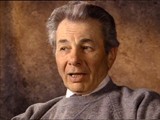<< Previous | Displaying results 301-325 of 571 for "" | Next >>
-
Ludmilla Page describes conditions in Oskar Schindler's munitions factory in Brünnlitz
Oral HistoryLudmilla was born to an assimilated Jewish family in Kishinev, Romania. She and her mother, a physician, were living in Poland when the Germans invaded on September 1, 1939. They were taken to Krakow. Ludmilla was forced to live in the Krakow ghetto; her mother was sent to the Warsaw ghetto. Ludmilla worked in a factory at the Plaszow labor camp for a businessman who was a friend of the German industrialist Oskar Schindler. In October 1944, Schindler attempted to save some Jewish workers by relocating them…
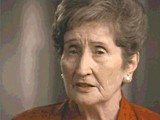
-
Leopold Page describes an act of sabotage and clandestinely listening to radio broadcasts while in Bruennlitz
Oral HistoryLeopold was a teacher in Krakow, Poland, when World War II began in 1939. While serving in the Polish army, he was captured by Germans. Leopold escaped from a prisoner-of-war transport. Soon after, he met the German industrialist Oskar Schindler. The two became friends. Leopold was forced to live in the Krakow ghetto. He later worked in Schindler's factory in Bruennlitz. He and the other Jews who worked there were treated relatively well and protected from the Nazis. After the war, Leopold moved to the…
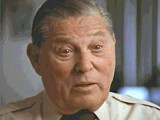
-
Ludmilla Page describes sabotage during production of munitions in Oskar Schindler's factory in Brünnlitz
Oral HistoryLudmilla was born to an assimilated Jewish family in Kishinev, Romania. She and her mother, a physician, were living in Poland when the Germans invaded on September 1, 1939. They were taken to Krakow. Ludmilla was forced to live in the Krakow ghetto; her mother was sent to the Warsaw ghetto. Ludmilla worked in a factory at the Plaszow labor camp for a businessman who was a friend of the German industrialist Oskar Schindler. In October 1944, Schindler attempted to save some Jewish workers by relocating them…
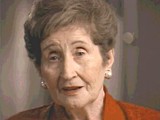
-
Ludmilla Page describes a celebration of Oskar Schindler's birthday in Bruennlitz toward the end of the war
Oral HistoryLudmilla was born to an assimilated Jewish family in Kishinev, Romania. She and her mother, a physician, were living in Poland when the Germans invaded on September 1, 1939. They were taken to Krakow. Ludmilla was forced to live in the Krakow ghetto; her mother was sent to the Warsaw ghetto. Ludmilla worked in a factory at the Plaszow labor camp for a businessman who was a friend of the German industrialist Oskar Schindler. In October 1944, Schindler attempted to save some Jewish workers by relocating them…
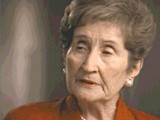
-
US veteran Tarmo Holma describes encountering camp survivors
Oral HistoryTarmo Holma is a veteran of the 11th Armored Division. During the invasion of German-held Austria, in May 1945 the 11th Armored (the "Thunderbolt" division) overran two of the largest Nazi concentration camps in the country: Mauthausen and Gusen.
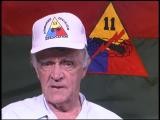
-
Charles Torluccio describes liberation and the role of medical staff
Oral HistoryCharles Torluccio is a veteran of the 11th Armored Division. During the invasion of German-held Austria, in May 1945 the 11th Armored (the "Thunderbolt" division) overran two of the largest Nazi concentration camps in the country: Mauthausen and Gusen.
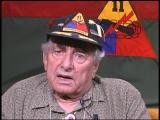
-
John D. Rastelli describes entering occupied Austria and burial of the dead in Mauthausen
Oral HistoryJohn D. Rastelli is a veteran of the 11th Armored Division. During the invasion of German-held Austria, in May 1945 the 11th Armored (the "Thunderbolt" division) overran two of the largest Nazi concentration camps in the country: Mauthausen and Gusen.
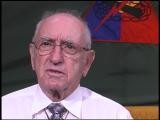
-
Darrell Romjue describes how US troops encoutered camps such as Mauthausen
Oral HistoryDarrell Romjue is a veteran of the 11th Armored Division. During the invasion of German-held Austria, in May 1945 the 11th Armored (the "Thunderbolt" division) overran two of the largest Nazi concentration camps in the country: Mauthausen and Gusen.
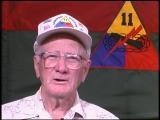
-
US veteran Ross Snowdon describes the camp quarry and barracks and the burial of the dead in Mauthausen
Oral HistoryRoss Snowdon is a veteran of the 11th Armored Division. During the invasion of German-held Austria, in May 1945 the 11th Armored (the "Thunderbolt" division) overran two of the largest Nazi concentration camps in the country: Mauthausen and Gusen.
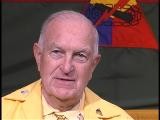
-
Thomas Buergenthal describes the liberation of the Sachsenhausen camp
Oral HistoryThomas's family moved to Zilina in 1938. As the Slovak Hlinka Guard increased its harassment of Jews, the family decided to leave. Thomas and his family ultimately entered Poland, but the German invasion in September 1939 prevented them from leaving for Great Britain. The family ended up in Kielce, where a ghetto was established in April 1941. When the Kielce ghetto was liquidated in August 1942, Thomas and his family avoided the deportations to Treblinka that occurred in the same month. They were sent…
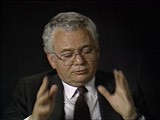
-
Thomas Buergenthal describes the impact of the Nuremberg trials on the development of international law
Oral HistoryJudge Thomas Buergenthal was one of the youngest survivors of the Auschwitz and Sachsenhausen concentration camps. He immigrated to the United States at the age of 17. Judge Buergenthal devoted his life to international and human rights law. He served as chairman of the United States Holocaust Memorial Museum’s Committee on Conscience; was named the Lobingier Professor of Comparative Law and Jurisprudence at the George Washington University Law School; and served for a decade as the American judge at…
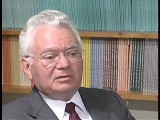
-
Thomas Buergenthal reflects on the value of truth commissions
Oral HistoryJudge Thomas Buergenthal was one of the youngest survivors of the Auschwitz and Sachsenhausen concentration camps. He immigrated to the United States at the age of 17. Judge Buergenthal devoted his life to international and human rights law. He served as chairman of the United States Holocaust Memorial Museum’s Committee on Conscience; was named the Lobingier Professor of Comparative Law and Jurisprudence at the George Washington University Law School; and served for a decade as the American judge at…
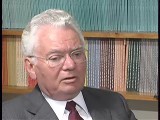
-
Thomas Buergenthal describes the significance of the Nuremberg trials to him both personally and as a lawyer and judge
Oral HistoryJudge Thomas Buergenthal was one of the youngest survivors of the Auschwitz and Sachsenhausen concentration camps. He immigrated to the United States at the age of 17. Judge Buergenthal devoted his life to international and human rights law. He served as chairman of the United States Holocaust Memorial Museum’s Committee on Conscience; was named the Lobingier Professor of Comparative Law and Jurisprudence at the George Washington University Law School; and served for a decade as the American judge at…
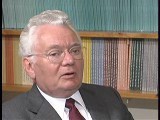
-
Thomas Buergenthal discusses quote from Abel Herzberg
Oral History"There were not six million Jews murdered; there was one murder, six million times."Holocaust survivor Abel Herzberg Judge Thomas Buergenthal was one of the youngest survivors of the Auschwitz and Sachsenhausen concentration camps. He immigrated to the United States at the age of 17. Judge Buergenthal devoted his life to international and human rights law. He served as chairman of the United States Holocaust Memorial Museum’s Committee on Conscience; was named the Lobingier Professor of Comparative Law…
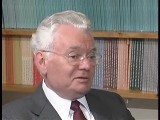
-
Thomas Buergenthal describes the charges brought at the International Military Tribunal at Nuremberg
Oral HistoryJudge Thomas Buergenthal was one of the youngest survivors of the Auschwitz and Sachsenhausen concentration camps. He immigrated to the United States at the age of 17. Judge Buergenthal devoted his life to international and human rights law. He served as chairman of the United States Holocaust Memorial Museum’s Committee on Conscience; was named the Lobingier Professor of Comparative Law and Jurisprudence at the George Washington University Law School; and served for a decade as the American judge at…
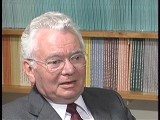
-
Thomas Buergenthal describes differing perspectives on international justice
Oral HistoryJudge Thomas Buergenthal was one of the youngest survivors of the Auschwitz and Sachsenhausen concentration camps. He immigrated to the United States at the age of 17. Judge Buergenthal devoted his life to international and human rights law. He served as chairman of the United States Holocaust Memorial Museum’s Committee on Conscience; was named the Lobingier Professor of Comparative Law and Jurisprudence at the George Washington University Law School; and served for a decade as the American judge at…
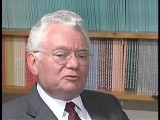
-
Thomas Buergenthal describes international tribunals
Oral HistoryJudge Thomas Buergenthal was one of the youngest survivors of the Auschwitz and Sachsenhausen concentration camps. He immigrated to the United States at the age of 17. Judge Buergenthal devoted his life to international and human rights law. He served as chairman of the United States Holocaust Memorial Museum’s Committee on Conscience; was named the Lobingier Professor of Comparative Law and Jurisprudence at the George Washington University Law School; and served for a decade as the American judge at…
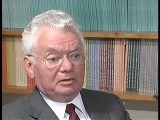
-
Thomas Buergenthal describes operations of international tribunals
Oral HistoryJudge Thomas Buergenthal was one of the youngest survivors of the Auschwitz and Sachsenhausen concentration camps. He immigrated to the United States at the age of 17. Judge Buergenthal devoted his life to international and human rights law. He served as chairman of the United States Holocaust Memorial Museum’s Committee on Conscience; was named the Lobingier Professor of Comparative Law and Jurisprudence at the George Washington University Law School; and served for a decade as the American judge at…
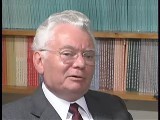
-
Thomas Buergenthal reflects on the importance of memorials
Oral HistoryJudge Thomas Buergenthal was one of the youngest survivors of the Auschwitz and Sachsenhausen concentration camps. He immigrated to the United States at the age of 17. Judge Buergenthal devoted his life to international and human rights law. He served as chairman of the United States Holocaust Memorial Museum’s Committee on Conscience; was named the Lobingier Professor of Comparative Law and Jurisprudence at the George Washington University Law School; and served for a decade as the American judge at…
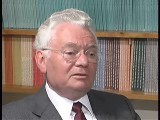
-
Thomas Buergenthal describes the plight of refugees today
Oral HistoryJudge Thomas Buergenthal was one of the youngest survivors of the Auschwitz and Sachsenhausen concentration camps. He immigrated to the United States at the age of 17. Judge Buergenthal devoted his life to international and human rights law. He served as chairman of the United States Holocaust Memorial Museum’s Committee on Conscience; was named the Lobingier Professor of Comparative Law and Jurisprudence at the George Washington University Law School; and served for a decade as the American judge at…
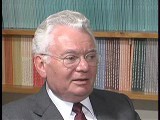
-
Thomas Buergenthal discusses whether it is ever too late to seek justice
Oral HistoryJudge Thomas Buergenthal was one of the youngest survivors of the Auschwitz and Sachsenhausen concentration camps. He immigrated to the United States at the age of 17. Judge Buergenthal devoted his life to international and human rights law. He served as chairman of the United States Holocaust Memorial Museum’s Committee on Conscience; was named the Lobingier Professor of Comparative Law and Jurisprudence at the George Washington University Law School; and served for a decade as the American judge at…
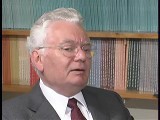
-
Aron (Dereczynski) Derman describes partisan activities near Vilna
Oral HistoryAron was born to a middle-class Jewish family in Slonim, a part of Poland between the two world wars. His parents owned a clothing store. After studying in a technical school, Aron worked as a motion-picture projectionist in a small town near Slonim. The Soviet army took over Slonim in September 1939. War broke out between Germany and the Soviet Union in June 1941. Aron returned to Slonim. The Germans soon occupied Slonim, and later forced the Jews into a ghetto. Aron was forced to work in an armaments…
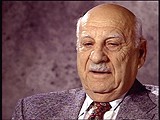
-
David (Dudi) Bergman describes liberation by US Army in mountains near Innsbruck
Oral HistoryThe Germans occupied David's town, previously annexed by Hungary, in 1944. David was deported to Auschwitz and, with his father, transported to Plaszow. David was sent to the Gross-Rosen camp and to Reichenbach. He was then among three of 150 in a cattle car who survived transportation to Dachau. He was liberated after a death march from Innsbruck toward the front line of combat between US and German troops.
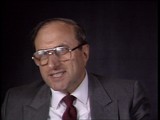
-
Ernest G. Heppner describes learning about the Holocaust and the fate of his relatives
Oral HistoryErnest's family owned a factory that made matzah, the unleavened bread eaten during Passover. In February 1939, three months after Kristallnacht (the "Night of Broken Glass" pogroms), Ernest and his mother fled to Shanghai, one of few havens for refugees without visas. His father and sister stayed behind in Germany; they perished during the Holocaust. A brother escaped to England. Ernest and his mother found work in Shanghai. In 1947, he came to the United States with his wife, whom he met and married in…
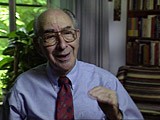
-
Wilek (William) Loew describes forced evacuation from Auschwitz
Oral HistoryWilek was the son of Jewish parents living in the southeastern Polish town of Lvov. His family owned and operated a winery that had been in family hands since 1870. Wilek's father died of a heart attack in 1929. Wilek entered secondary school in 1939. Soon after he began school, World War II began with the German invasion of Poland. Lvov was in the part of eastern Poland annexed by the Soviet Union. Although the Soviets took over Wilek's home and the family business, Wilek was able to continue his…
